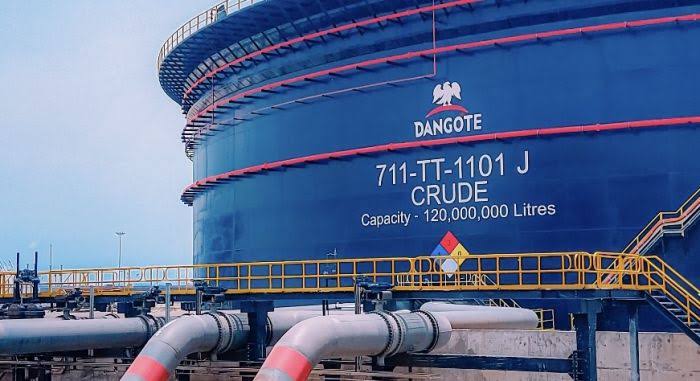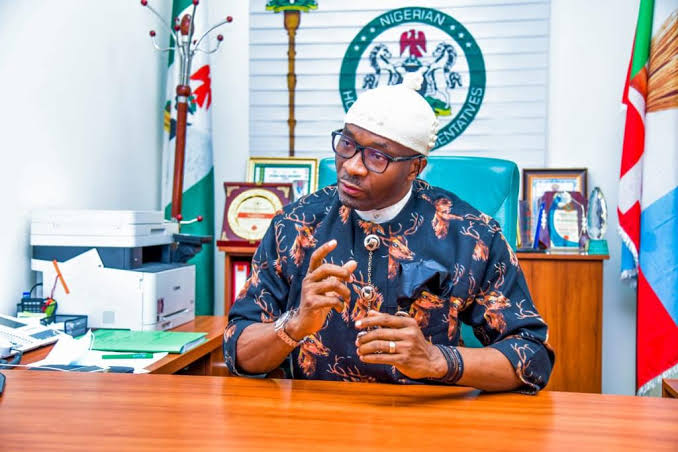News
Most filling stations yet to get Dangote petrol – IPMAN

One week after the Nigerian National Petroleum Company Limited commenced loading Premium Motor Spirit, popularly called petrol, at the Dangote Petroleum Refinery, most filling stations across the country have yet to get the product.
Independent petroleum marketers who operate over 70 per cent of filling nationwide, told Sunday PUNCH on Saturday that petrol from Dangote refinery had yet to be dispensed to them by NNPC.
When contacted and asked if most dealers have started receiving the product from the $20bn Lekki-based plant, the National President of the Independent Petroleum Marketers Association of Nigeria, Abubakar Maigandi, replied, “We are waiting to start.”
NNPC officially commenced the loading of petrol from the 650,000 barrels per day capacity Dangote Petroleum Refinery last Sunday.
NNPC said at the time that it was to load 16.8 million litres of petrol from the plant, in contrast to the 25 million litres that the refinery had announced earlier as what it would release to the national oil company daily.
The spokesperson of NNPC, Olufemi Soneye, confirmed that over 70 trucks of PMS departed the Dangote refinery last Sunday, which was the first day for the release of petrol from the plant to the domestic market.
Since then, the company has been taking products from the plant, as it also directed major marketers to lift petrol based on agreements with them, but on Saturday it was confirmed that independent marketers were yet to get Dangote petrol.
NNPC, which is currently the sole off-taker of PMS from the Lagos-based refinery, did not immediately respond to enquiries on why IPMAN members have not been allowed to access the product from the Dangote refinery.
The National Publicity Secretary of IPMAN, Chief Ukadike Chinede, also confirmed that members of the association were still awaiting NNPC as regards petrol supply from the Dangote refinery.
Asked if most filling stations particularly those operated by IPMAN members have started getting Dangote petrol, he replied, “No, we have not started getting Dangote fuel from NNPC. As of this time, we haven’t.
“The current situation is that NNPC is still serving us with their imported products. That’s what we are loading for now and they haven’t communicated to us about the issue of Dangote.
“I think what they (NNPC) did was to take Dangote fuel to their own (NNPC) retail outlets because there was no design for NNPC to give IPMAN products via trucks.”
Ukadike said independent marketers were willing buyers and called for the release of products to IPMAN, as he noted that the national oil company had been supplying Dangote petrol to major oil marketers.
“What we do is self-picking. We use our trucks to pick products. So if we were factored into picking up petrol from Dangote, our trucks would have been at its terminals.
“But this time, it is only for NNPC mobilised trucks. We are still waiting for further directives and like I said in other interviews, we are willing buyers and what we are looking for is a willing seller.”
On why the cost of Dangote petrol is high, the IPMAN official said, “I heard that NNPC is selling at N776/litre to major marketers but they haven’t started selling to independent marketers.
“When you add logistics costs and other necessary things, you would understand why it still sells at the current price. However, when there is an adequate supply of petrol, the price will reduce. Also, the price of diesel is still high. Once the price of diesel goes down, the price of trucking will go down.”
Senior officials of some major oil marketing firms told one of our correspondents that they had commenced the lifting of petrol from the Dangote refinery based on specific arrangements with NNPC.
They also confirmed that the cost which they bought the product from NNPC was N766/litre, but could not tell the price at which the product was sole to NNPC by Dangote.
“As I told you last week, the cost which NNPC sold to us is N766/litre. We paid NNPC, not Dangote and we lifted products based on the arrangement with NNPC. Dangote and NNPC know the price which they both agreed on, so they are in the best position to state that,” a major marketer who spoke in confidence due to lack of authorisation to speak on the matter, stated.
Last week, NNPC’s spokesperson said the company bought petrol from Dangote at N898/litre, but this was countered by the refinery, without stating the price that it sold the product to NNPC.
“The report stating that we (NNPC) purchased it at N1,300/litre is false. For this initial loading, the price was N898/litre,” Soneye had stated.
But Dangote refinery denied the price with Anthony Chiejina, Dangote Group’s Chief Branding and Communications Officer, labelling the claim as “misleading and mischievous,” stating that it undermined the company’s recent milestone in addressing Nigeria’s long-standing energy crisis.
News
A Chat with Janet Odio Okolo: A Mother’s Journey Raising a Child with Down Syndrome

News
Hon. Nnamchi Begins Street Lights Deployment In Isi Uzo(Photos)

Honourable Paul Sunday Nnamchi, representing Enugu East/Isi Uzo Federal Constituency in the 10th House of Representatives, has fulfilled his promise to illuminate communities in Isi Uzo Local Government Area.
The lawmaker has just begun the deployment of high-density solar-powered street lights in Ikem Nkwo, marking the beginning of a massive rollout of the street lamps across the communities in Isi Uzo.
This initiative, which started in Enugu East Local Government Area in 2024, aims to support the fight against insecurity in the state which according to him was to add to what Chief Security Officer of Enugu State Barrister Peter Mba had done to secure the state to attracts foreign investments.
The lawmaker expressed concern over banditry attacks, particularly by herdsmen, in some communities within Isi Uzo and Enugu East Local Government Areas in the recent pasts.
He believes that illuminating these areas with high-density street lights would help address the insecurity adding that he was prioritizing border and farming communities in Isi Uzo, where banditry has displaced residents and restricted farming activities.
Communities in Ikem, Eha-Amufu in Isi Uzo which borders Enugu and Benue State and Ugwogo-Nike in Enugu East have been vulnerable to these attacks due to their strategic locations.
News
May Day: Kalu Hails Workers, Applauds Their Role in Nation Building

By Gloria Ikibah
Deputy Speaker of the House of Representatives, Rep. Benjamin Kalu, has extended warm wishes to Nigerian workers as the country marks the 2025 edition of International Workers’ Day.
Kalu praised workers across various sectors for their commitment and resilience, describing them as the engine that keeps the nation moving. He acknowledged their sacrifices and unrelenting drive, especially during tough economic times.
In his message, he highlighted the efforts of the current administration under President Bola Tinubu to improve the welfare of public servants. He referenced the National Assembly’s prompt backing of the new minimum wage as a sign of the government’s seriousness about workers’ wellbeing.
The Deputy Speaker appealed for continued patience and understanding from Nigerians, noting that the ongoing economic reforms, while challenging, are designed to bring long-term relief and prosperity.
Kalu also called for unity, and said the country can only overcome its present difficulties if citizens and leaders work together in good faith.
He therefore urged workers to keep the faith and remain steadfast in their duties, assuring them that brighter days are on the horizon, and wished Nigerian workers a peaceful and fulfilling May Day celebration.
-

 Metro19 hours ago
Metro19 hours agoGunmen storm University of Benin teaching hospital, kill doctor
-

 Metro19 hours ago
Metro19 hours agoFCTA destroys 601 motorbikes over violations
-

 News10 hours ago
News10 hours agoAlleged money laundering: EFCC produces Aisha Achimugu in court
-

 News19 hours ago
News19 hours agoJust in: FG declares tomorrow public holiday
-

 News12 hours ago
News12 hours agoJUST IN: Major General Paul Ufuoma Omu Rtd, dies at 84
-

 News12 hours ago
News12 hours agoTinubu hails Dangote’s World Bank appointment
-

 News14 hours ago
News14 hours agoSAD! Professor’s son takes own life inside varsity staff quarters
-

 News18 hours ago
News18 hours agoFull list: FG approves N110bn to rehabilitate medical schools 18 institutions











